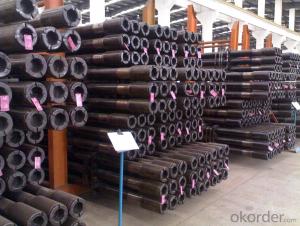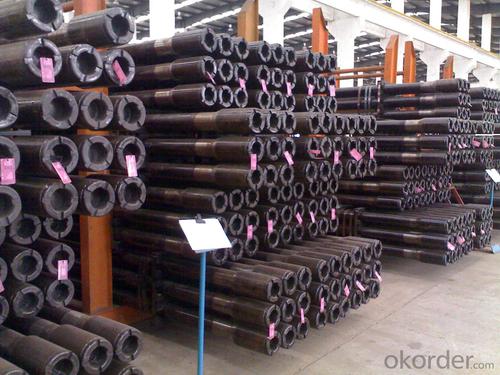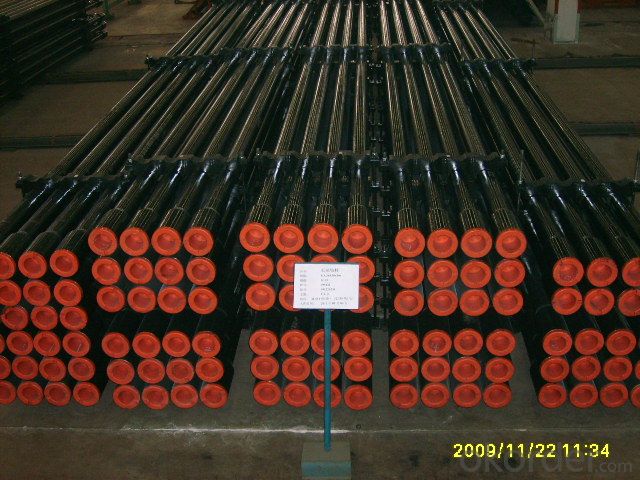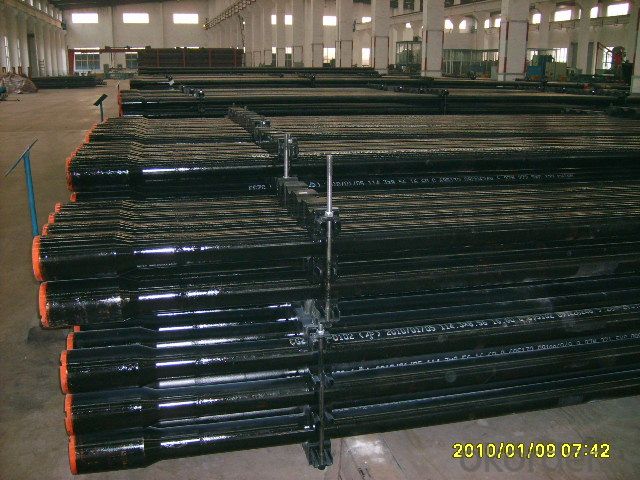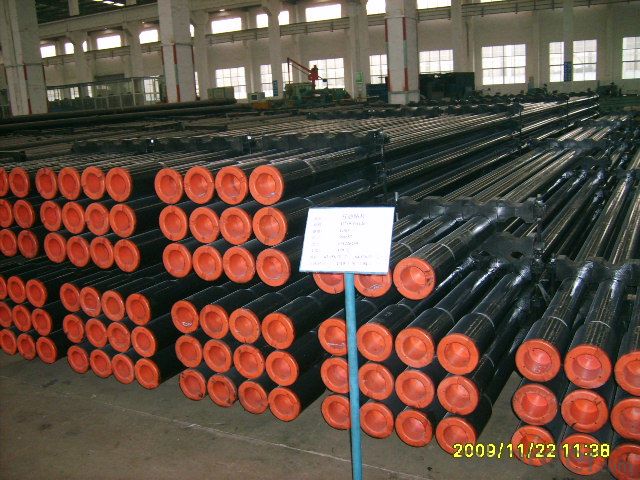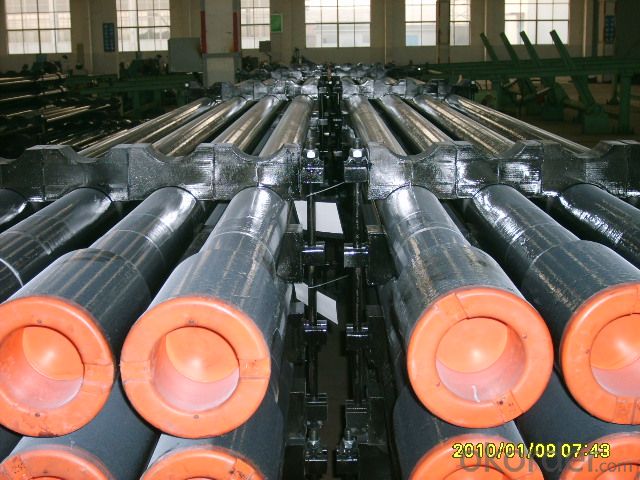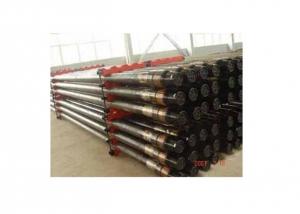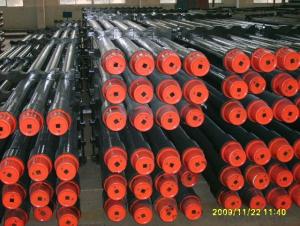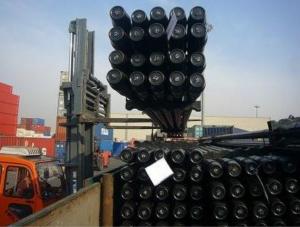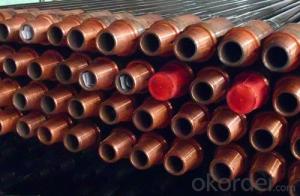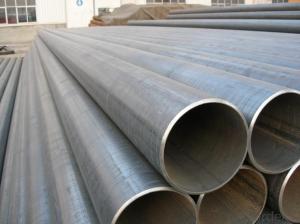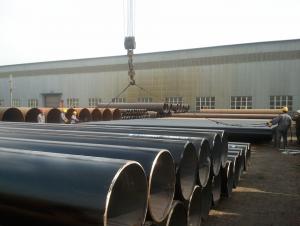2 3/8--5 1/2 API 5DP drill pipe good price
- Loading Port:
- Qingdao
- Payment Terms:
- TT OR LC
- Min Order Qty:
- 10 m.t.
- Supply Capability:
- 100000 m.t./month
OKorder Service Pledge
Quality Product, Order Online Tracking, Timely Delivery
OKorder Financial Service
Credit Rating, Credit Services, Credit Purchasing
You Might Also Like
Specifications
1) OD: 2 7/8", 3 1/2", 4", 4 1/2", 5" 5-1/2"
2) Steel Grade: E75, X95, G105, S135
3) All drill pipe are made according to API
1) OD: 2 7/8", 3 1/2", 4", 4 1/2", 5" 5-1/2"
2) Steel Grade: E75, X95, G105, S135
3) Type of end finish: EU-external upset, IEU-internal & external upset
4) All drill pipe are made according to API 5D
5) We can provide in many conditions, with or without hard banding (Arnco100, Arnco300, tungsten carbide etc).
- Q: What are the factors to consider when designing a steel pipe system?
- When designing a steel pipe system, several factors need to be considered. Firstly, the intended purpose of the system and the materials that will be transported through it are crucial. This determines the required pipe diameter, thickness, and material type to ensure compatibility and prevent corrosion or leakage. Secondly, the operating conditions, such as temperature, pressure, and flow rate, must be examined to select pipes with suitable strength and resistance properties. Additionally, factors like environmental conditions, including soil characteristics and exposure to chemicals or natural elements, should be evaluated to determine the necessary protective coatings or insulation. Lastly, considerations like installation requirements, regulatory compliance, and maintenance accessibility should be taken into account to design a practical and efficient steel pipe system.
- Q: What is the difference between steel pipe and tubing?
- Steel pipe and tubing are both used in various applications, but they have distinct differences. The primary difference between steel pipe and tubing lies in their shape and dimensions. Steel pipe is typically round in shape and has a hollow interior. It is manufactured in a variety of sizes and thicknesses to accommodate different pressure and temperature requirements. Steel pipe is commonly used in construction, plumbing, and oil and gas industries for conveying fluids or gases. On the other hand, steel tubing can come in various shapes, including round, square, and rectangular. Unlike steel pipe, tubing is often measured by its outside diameter and wall thickness. Steel tubing is commonly used in structural applications, such as building frames, automotive components, and machinery. Another difference between steel pipe and tubing is their manufacturing process. Steel pipe is typically made from solid steel billets that are heated and stretched to create a seamless or welded tube. Tubing, on the other hand, can be produced through various methods, including hot or cold rolling, welding, or extrusion. In terms of strength and durability, both steel pipe and tubing offer excellent qualities. However, the specific requirements of the application will determine which one is more suitable. Steel pipe is often chosen for high-pressure or high-temperature applications, while steel tubing is preferred for structural purposes or when a specific shape is required. In summary, the main difference between steel pipe and tubing lies in their shape, measurement methods, and manufacturing processes. While steel pipe is round and measured by its inside diameter, tubing can come in various shapes and is typically measured by its outside diameter. Both steel pipe and tubing are widely used in different industries, but the choice depends on the specific application and requirements.
- Q: What is the difference between ERW and SAW steel pipes?
- ERW (Electric Resistance Welded) steel pipes are manufactured by welding the edges of the steel strip or coil together to form a pipe. On the other hand, SAW (Submerged Arc Welded) steel pipes are manufactured by welding the steel plates or coils together using a submerged arc welding process. The main difference between the two is the method of welding used. SAW pipes generally have a higher strength and better dimensional accuracy compared to ERW pipes.
- Q: How are steel pipes used in the construction of nuclear power plants?
- Steel pipes are used in the construction of nuclear power plants for various purposes, including transporting coolant, steam, and gases, as well as providing structural support for the overall system. These pipes are specifically designed to withstand high pressures, extreme temperatures, and corrosive environments, ensuring the safe and efficient operation of the nuclear power plant.
- Q: What are low-pressure carbon steel tubes?
- Any of various steels that contain less than 2.11% of the mass of carbon but contain no alloying elements. Sometimes referred to as plain carbon steel or carbon steel.Carbon steel, in addition to carbon, usually contains a small amount of silicon, manganese, sulfur and phosphorus.1) according to the use of carbon steel can be divided into carbon structural steel, carbon tool steel and easy to cut structural steel three categories, carbon structural steel is divided into engineering construction steel and machine manufacturing structural steel two kinds;(2) by refining methods can be divided into open hearth steel, converter steel;(3) according to deoxidization methods, they can be divided into boiling steel (F), killed steel (Z), semi killed steel (b) and special killed steel (TZ);(4) according to the carbon content of the steel can be divided into low carbon steel (WC = 0.25%), carbon steel (WC0.25% - 0.6%) and high carbon steel (WC>0.6%);(5) according to the quality of steel, carbon steel can be divided into ordinary carbon steel (phosphorus, sulfur, higher), high quality carbon steel (low phosphorus and sulfur) and high quality steel (lower phosphorus and sulfur) and super quality steel.Description: the carbon content in general carbon steel is higher, the hardness is higher, the strength is higher, but the plasticity is lower.
- Q: Can steel pipes be used for water treatment plants?
- Yes, steel pipes can be used for water treatment plants. Steel pipes are widely used in water treatment plants due to their high durability, strength, and resistance to corrosion. They can effectively handle the high pressure and flow requirements of water treatment processes. Additionally, steel pipes can be easily welded and joined, making them suitable for various applications within water treatment plants, such as transporting raw water, treating chemicals, and distributing treated water.
- Q: What are the advantages of using steel pipes in marine applications?
- There are several advantages of using steel pipes in marine applications. Firstly, steel pipes are highly durable and have a high resistance to corrosion. This is crucial in marine environments where pipes are constantly exposed to saltwater, which can cause rapid deterioration of materials. Steel pipes are able to withstand the harsh conditions and maintain their structural integrity for extended periods of time. Another advantage of using steel pipes in marine applications is their strength. Steel is a strong and robust material that can withstand the high pressure and extreme conditions often encountered in marine operations. This makes steel pipes ideal for transporting fluids, such as water, oil, and gas, in marine environments. Additionally, steel pipes offer excellent fire resistance. In the event of a fire on a ship or offshore platform, steel pipes can provide a reliable fire barrier, preventing the spread of flames and ensuring the safety of personnel and equipment. Furthermore, steel pipes are highly versatile and can be easily fabricated to meet specific requirements. They can be manufactured in various sizes, shapes, and thicknesses, allowing for customization to fit the specific needs of marine applications. Steel pipes can also be easily welded together, providing a seamless and leak-proof system. Lastly, steel pipes are cost-effective in the long run. Although the initial investment may be higher compared to other materials, the durability and longevity of steel pipes make them a cost-efficient choice. With minimal maintenance and a long lifespan, steel pipes reduce the need for frequent replacements, resulting in significant cost savings over time. In conclusion, the advantages of using steel pipes in marine applications include their durability, resistance to corrosion, strength, fire resistance, versatility, and cost-effectiveness. These factors make steel pipes a reliable and efficient choice for various marine operations, ensuring the safe and efficient transport of fluids in harsh marine environments.
- Q: What are the factors to consider while selecting steel pipes for a project?
- When selecting steel pipes for a project, some important factors to consider include the intended application or purpose of the pipes, the required strength and durability, the size and dimensions needed, the corrosion resistance requirements, the availability and cost, and any specific industry standards or regulations that need to be met.
- Q: Are steel pipes suitable for underground irrigation systems?
- Underground irrigation systems can indeed benefit from the use of steel pipes. Renowned for their durability and strength, steel pipes exhibit resistance to corrosion and can withstand significant pressure. Furthermore, they are less prone to cracking or breaking when subjected to the weight and pressure of the ground. Moreover, steel pipes boast an extended lifespan, alleviating the need for frequent replacements. Nevertheless, it is crucial to consider the composition of the water being conveyed, as certain minerals or chemicals may induce corrosion over time. In such instances, it might be necessary to employ corrosion-resistant coatings or liners. All in all, steel pipes represent a dependable choice for underground irrigation systems, particularly in regions characterized by elevated water pressure or when durability takes precedence.
- Q: Fastener type steel pipe scaffold steel pipe wall thickness
- According to the "construction of fastener type steel pipe scaffold safety technical specifications JGJ130-2011" stipulates that the specification of steel pipe should be Phi 48.3 * 3.6, that is, wall thickness is 3.6mm. The standards in Shanghai are in line with national standards and 3.25mm can be used.Shelf tubes commonly used specifications, sizes are generally 48.3x3.0, 48.3x3.25, 48.3x3.5.
Send your message to us
2 3/8--5 1/2 API 5DP drill pipe good price
- Loading Port:
- Qingdao
- Payment Terms:
- TT OR LC
- Min Order Qty:
- 10 m.t.
- Supply Capability:
- 100000 m.t./month
OKorder Service Pledge
Quality Product, Order Online Tracking, Timely Delivery
OKorder Financial Service
Credit Rating, Credit Services, Credit Purchasing
Similar products
Hot products
Hot Searches
Related keywords
